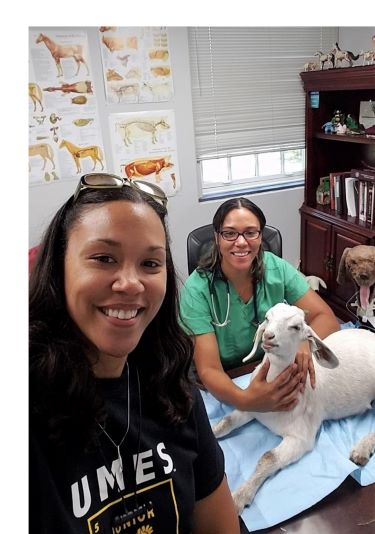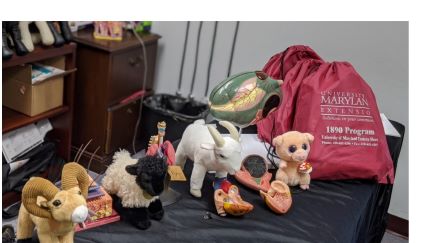UMES’ resident veterinarian goes virtual with summer recruiting

COVID-19 put the kibosh on Kimberly Braxton’s summer plans to provide local teens with an insider’s perspective on academic paths available to those considering a career caring for animals, large and small.
Instead, UMES’ resident veterinarian found another outlet to channel her passion for recruiting students she hopes might follow in her footsteps.
Braxton accepted an invitation from Dr. Kristin Sampson, a friend and colleague, to serve as a guest presenter for a virtual “vet medicine intro to internship” course offered through a summer program called STEM Career Prep.
“I was able to host my sessions from my office in Trigg Hall and include interactive activities and live visits from some of the younger UMES farm animals,” Braxton said.
Sampson is a former middle school principal whose research inspired her to focus “on providing equitable education to African American students and other students of color” in science, technology, engineering and math (STEM).
Participants in the summer STEM Career Prep program were primarily from the Washington and Baltimore areas, locales where UMES traditionally does well attracting undergraduates.
Sampson needed compelling content with “attention to detail to captivate our students, and distinguish our offering from the challenging virtual learning they just completed for the 2019-20 school year.”
“Dr. Braxton exceeded all expectations by presenting a thoughtful and inspiring, live virtual presentation to 6th (through) 10th grade students,” Sampson said. “She used various media platforms – including video, still slides, polls and photos – to communicate with our students who greatly benefited from her expert knowledge of vet medicine.”

Like many educators, Braxton found herself this past spring re-calibrating lectures and lessons and saw the “virtual vet camp” as an opportunity to fine-tune those skills some predict will take on greater importance in delivery of distance education.
“It’s hard to make a connection online with veterinarian medicine. Hearing, feeling, touching animals is important” because they obviously can’t speak, Braxton said.
“I love my students here,” she said. “You just see them light up when they come in contact with animals.”
During her two sessions, Braxton tried “to replicate that as much as I could” using interactive anatomy models, including an artificial dog’s leg to drawn blood from as well as live domestic pets and a kid, or baby goat.
What the summer program participants didn’t see was the person operating the camera looked just like the one in front of it. Braxton’s twin sister, Stephanie. volunteered to help with the technology and camera.
Both are 2007 UMES alumnae. Kimberly earned a bachelor’s degree in agriculture /animal science with a pre-veterinarian concentration and went on to Purdue University to become a veterinarian. Stephanie’s UMES degree is in criminal justice and she also holds a master’s degree in cyber-security policy.
Sampson said, “Dr. Braxton exposed our students to the daily tasks of vets, college course trajectory, study abroad opportunities in vet medicine, and diversity statistics.”
Some two dozen students signed up for her second session, including two from North Carolina. Braxton even created two options for independent projects for students who wanted to take participation a step further.
“We are so thankful she took the time out of her busy schedule to volunteer to such a worthy cause – STEM career preparation and exposure to minority students,” Sampson said.
UMES’ admission office pitched in by helping assemble a “grab bag” of items like stuffed animals and recruiting material Braxton sent to each participant in her sessions.
“As a veterinarian I have met many individuals with a passion for animals,” she said. “As a college-level educator, this is what motivates me to inspire students to turn that passion into a career.”

